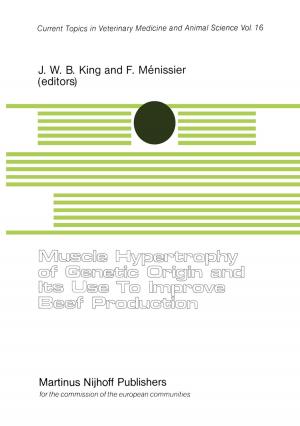Neurohumoral Regulation of Coronary Flow
Role of the Endothelium
Nonfiction, Health & Well Being, Medical, Specialties, Internal Medicine, Cardiology| Author: | ISBN: | 9789401119009 | |
| Publisher: | Springer Netherlands | Publication: | December 6, 2012 |
| Imprint: | Springer | Language: | English |
| Author: | |
| ISBN: | 9789401119009 |
| Publisher: | Springer Netherlands |
| Publication: | December 6, 2012 |
| Imprint: | Springer |
| Language: | English |
During the last decade we have witnessed a rapid expansion of our knowledge of the role of the endothelium in the control of vascular tone and hemostasis. In paricular, developments in molecular biology have enabled us to understand its physiology in greater detail. Furthermore, it is now clear that dysfunction of the endothelium contributes to various cardiovascular diseases. This is especially true for the coronary vascular bed. Development of atherosclerosis, disturbed vasomotor tone in stable ischemic syndromes, and the interaction of thrombocytes with the endothelium in acute ischemic syndrome are all consequences of endothelium dysfunction. Also, secondary changes in endothelial function have been described, for instance in chronic heart failure. This monograph reviews the present knowledge of the role of the endothelium in the control of coronary flow. The authors lead the reader through this topic starting at the basic physiology of endothelial function and the principles of coronary flow regulation. Next, the use of modern clinical techniques to evaluate endothelial function such as positron emission tomography and angioscopy are discussed. Subsequently, several pathophysiological processes and the role of endothelium are addressed. Finally, the interaction of various presently used cardiovascular drugs with the endothelium is indicated. It is the combination of basic sciences with clinical observations in this book which may be appreciated by a large number of scientists and physicians active in the field of cardiovascular disease. It is also this combination of different disciplines which will determine future developments and new avenues in pharmacotherapy involving the endothelium.
During the last decade we have witnessed a rapid expansion of our knowledge of the role of the endothelium in the control of vascular tone and hemostasis. In paricular, developments in molecular biology have enabled us to understand its physiology in greater detail. Furthermore, it is now clear that dysfunction of the endothelium contributes to various cardiovascular diseases. This is especially true for the coronary vascular bed. Development of atherosclerosis, disturbed vasomotor tone in stable ischemic syndromes, and the interaction of thrombocytes with the endothelium in acute ischemic syndrome are all consequences of endothelium dysfunction. Also, secondary changes in endothelial function have been described, for instance in chronic heart failure. This monograph reviews the present knowledge of the role of the endothelium in the control of coronary flow. The authors lead the reader through this topic starting at the basic physiology of endothelial function and the principles of coronary flow regulation. Next, the use of modern clinical techniques to evaluate endothelial function such as positron emission tomography and angioscopy are discussed. Subsequently, several pathophysiological processes and the role of endothelium are addressed. Finally, the interaction of various presently used cardiovascular drugs with the endothelium is indicated. It is the combination of basic sciences with clinical observations in this book which may be appreciated by a large number of scientists and physicians active in the field of cardiovascular disease. It is also this combination of different disciplines which will determine future developments and new avenues in pharmacotherapy involving the endothelium.















